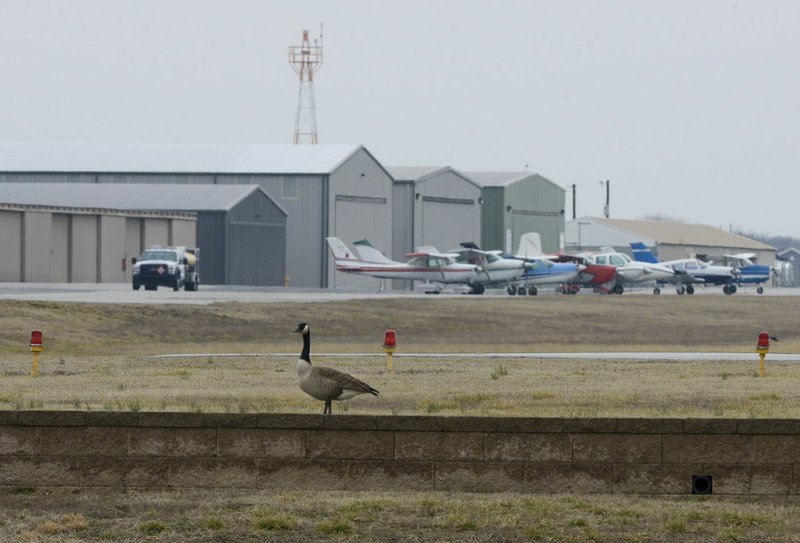BENTONVILLE — Geese have become a problem in this Northwest Arkansas city, and as officials in cities around the state have done, Bentonville leaders are looking at alternatives for addressing it.
Bentonville's goose problem is at its municipal airport, which raises concerns because of the danger of aircraft hitting the birds in flight and possibly crashing.
The city is considering using noise and lasers to scare the birds away, and killing them if the other methods don't work, officials said.
The Airport Advisory Board, City Council, city staff members and Bentonville Mayor Stephanie Orman have received comments expressing concern about and opposition to killing the geese.
The airport board has been contacted by about a half-dozen people on the matter.
The feedback started after airport manager Chuck Chadwick informed the airport board on Feb. 7 that the city was seeking a permit from the Arkansas Game and Fish Commission to kill the geese.
On Tuesday, the geese problem surfaced at a City Council meeting, where city leaders discussed it.
Typically geese spend about four months each spring at and near the airport. Over several years, the board has looked at various ideas to resolve the matter.
Worldwide since 1988, more than 250 people have been killed because of aircraft striking wildlife, according to Bird Strike Committee USA, a volunteer organization that promotes wildlife strike awareness. Wildlife strikes are estimated to cause more than $900 million a year in damage to U.S. civil and military aircraft, according to the organization.
Several Bentonville city departments, including Parks and Recreation and police, are working to find an alternative to killing the geese, Orman told council members at Tuesday's meeting.
Council Member Tim Robinson asked for more clarity on the situation. "How many geese have lost their lives?" he asked. "Did that actually happen?"
Dennis Birge, transportation engineer for Bentonville, said a plane hit a bird Feb. 8, but he didn't know if it was a goose.
"I don't know of any goose that has lost its life," he said, raising chuckles in the council chambers.
Bill Burckart, council member and former airport board member, said it's important for officials to consider the potential loss of human life.
"It's a very serious issue, those bird strikes," he said. "It's a difficult situation. It doesn't leave you with a lot of alternatives."
Octavio Sanchez, council member and airport board member, said pilots, passengers and planes need to be the priority, not the geese.
"It is better for us to kill as many geese as needed instead of suffering a catastrophe," he said.
Still, Sanchez said he has told people who have emailed him that killing the birds would be the last resort.
Options include using noise makers, decoys and green lasers to scare the birds away, Birge said.
Faced with a goose problem at Burns Park golf course in 2014, North Little Rock officials bought a dog that was trained to chase away the geese. The dog, which cost the city $1,600, is still being used.
Orman said city and airport officials are recording when various techniques are used and what the results are. "We're not taking any options off the table."
The airport board has also discussed changing the habitat around the airport to deter the birds.
The habitat is changing anyway with the development of Osage Park north of Bentonville Lake.
Martin Smith of Ecological Design Group, the civil engineer and ecological restoration company working on the 74-acre park north of the airport's runway, told airport board members in December about the possibility of creating a 10-foot to 12-foot fringe of vegetation around the lake's edge to discourage geese from congregating there.
Representatives with wildlife humane societies say the best long-term solution is multifaceted and includes limiting flock growth, frightening the geese and changing their habitat to make it less attractive.
"These solutions are not only more humane but more effective," Amanda Good, Arkansas director for the Humane Society of the United States, wrote in an email to council members.
She said killing geese will be ineffective long-term because more will return in subsequent years. She offered the society's help to develop a humane program and provided a 10-page Canadian goose management plan.
The plan includes a history of the geese, their reproductive practices, a seasonal timeline of when nonlethal measures are most effective, and supplemental tools and techniques to a geese management plan.
"This will not be a single-solution issue," Richard Ham, airport board chairman, said in an email to a concerned resident who recommended partnering with the Carolina Waterfowl Rescue to develop a nonlethal solution. "The challenge is always managing several competing interests -- protection of human life primarily, wildlife management and blending aesthetic community landscapes."
He encouraged board members to do more research so the discussion can continue at the next airport board meeting.
Information for this report was provided by Jake Sandlin of the Arkansas Democrat-Gazette.
Metro on 03/04/2019

